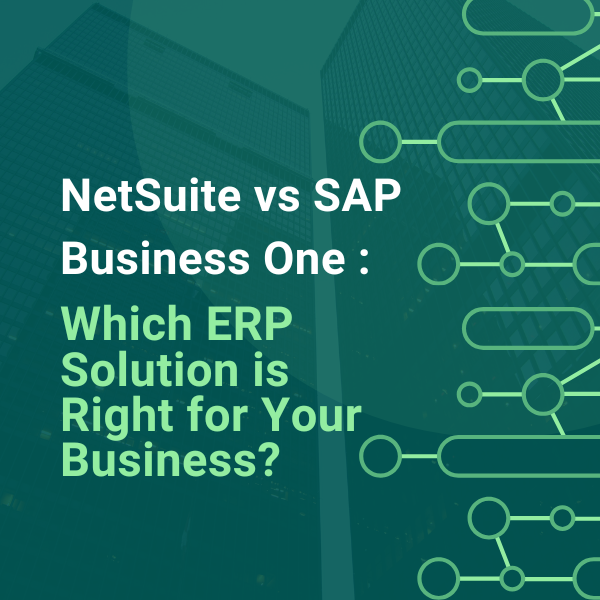Choosing the right ERP system is one of the most critical decisions a growing business can make. It’s not just about picking software—it’s about choosing a foundation that will support your operations, finances, and growth for years to come. Two names often come up when companies start their ERP journey: **NetSuite** and **SAP Business One**.
While both are powerful, they cater to businesses differently. Let’s dive into their key differences, strengths, and how you can decide which one is the best fit for your business.
What is NetSuite?
NetSuite is a **cloud-native ERP** platform designed for fast-growing companies and enterprises looking for scalability. Since its inception, NetSuite has been all about digital-first operations—finance, CRM, HR, supply chain, and e-commerce live seamlessly under one unified cloud system.
- Fully cloud-based (no on-premise hassles)
- Strong industry-specific solutions
- Global capabilities for multi-subsidiaries, currencies, and compliance
- Frequent updates and innovations (backed by Oracle)
NetSuite’s biggest draw is its ability to grow with you. Whether you’re a startup eyeing international expansion or a mid-sized company streamlining multiple departments, NetSuite adapts quickly.
What is SAP Business One?
SAP Business One—or B1 as it’s often called—is aimed at **small to mid-sized businesses** needing an affordable but robust ERP. Unlike NetSuite, SAP B1 isn’t cloud-native at its core; it was originally on-premise but now offers hosted and cloud deployment options.
- Geared toward SMBs with local operations
- Strong financials, inventory, and reporting features
- On-premise and cloud hosting choices
- Costs can be lower for smaller operations
SAP B1 is a great fit for those who want ERP without overwhelming complexity, though scaling across geographies or managing multi-subsidiaries can get tricky.
NetSuite vs SAP Business One: A Straightforward Comparison
| Feature | NetSuite | SAP Business One |
|---|---|---|
| Deployment | 100% Cloud-native | On-premise + Cloud/Hosted |
| Target Market | Mid-size to large, fast-growing/global businesses | Small to mid-sized businesses |
| Scalability | Highly scalable for multi-company, multi-location setups | Limited scalability for global enterprises |
| Customization | Extensive with SuiteApps & scripts | Moderate customization available |
| Updates | Automatic (twice yearly) via Oracle | Manual upgrades (if on-premise) |
| Industry Fit | Strong in retail, manufacturing, services, e-commerce, financials | Focused on SMB manufacturing, distribution, and local services |
| Cost Structure | Subscription-based, scalable with growth | Lower entry cost, license + maintenance fees |
Which One is Right for You?
It really comes down to **where your business is now—and where you’re headed.**
**Choose NetSuite if** you’re a growing company with global ambitions, multiple entities, and complex operations. If your aim is scalability, real-time insights, and being future-ready, NetSuite’s unified cloud platform has the edge.
**Choose SAP Business One if** you’re a small or mid-sized business focused on local operations, cost-conscious budgeting, and straightforward ERP needs. It’s a solid first step into ERP without huge upfront risks.
Final Thoughts
Investing in ERP software is not a short-term decision—it’s about choosing a growth partner for the next decade. NetSuite shines as a future-proof, cloud-first platform for ambitious businesses, while SAP Business One serves as a practical, cost-efficient solution for SMBs.
Before deciding, ask yourself: *Do I want software that grows with my business—or one that simply serves my business where it is today?*
That single question may just tip the balance between **NetSuite** and **SAP Business



